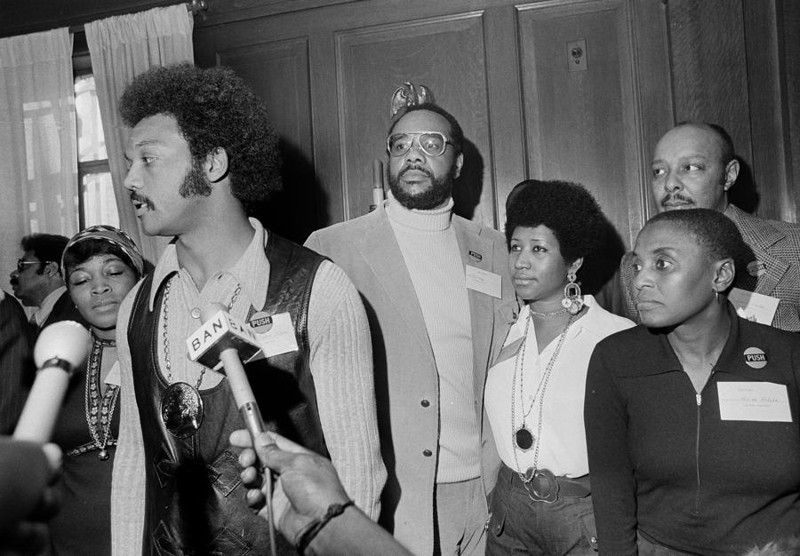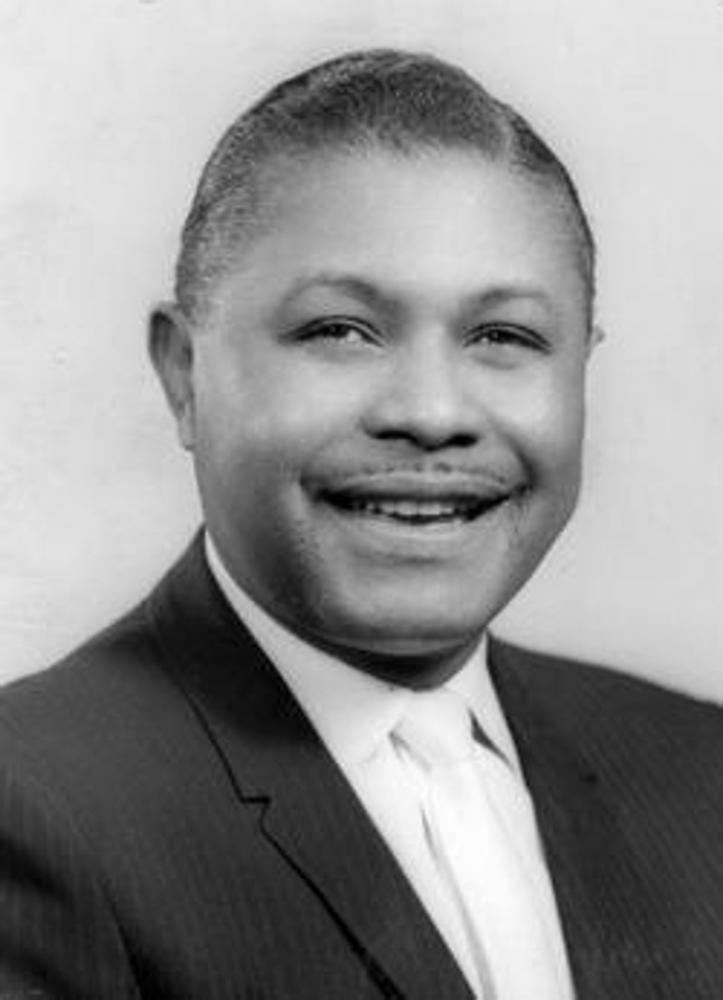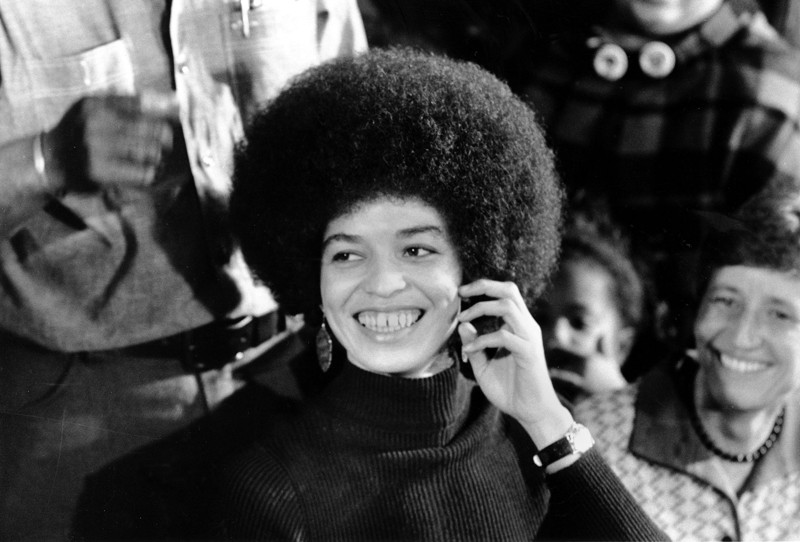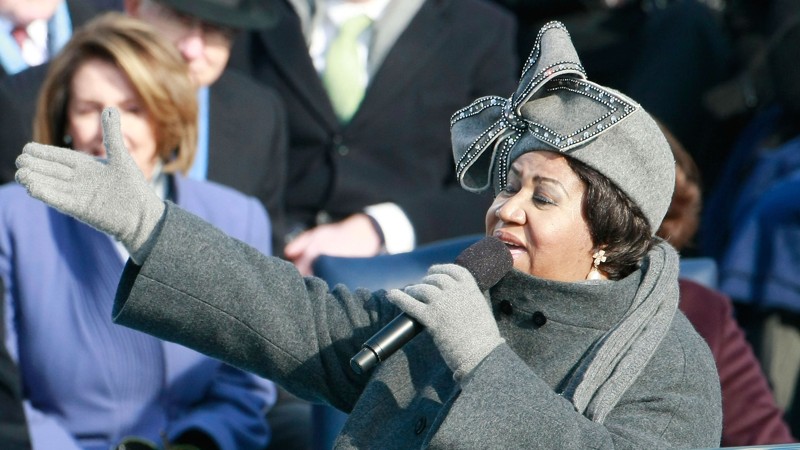Aretha Franklin Used Her Voice to ‘Deliver Music tor Social Justice’

Feb. 16, 1968, was a good day to be Queen.
It was in the middle of a stunning 18-month period when Aretha Franklin would score four Top 5 albums and nine Top 10 singles.
She was returning home for a concert at Cobo Hall in Detroit, where Mayor Jerome Cavanaugh had declared the date “Aretha Franklin Day.”

Photo: Jim Wells/AP //Atlanta Journal-Constitution
Franklin was lauded with an armful of plaques and certificates. Then came a visit from a King.
Martin Luther King Jr. surprised the crowd of 12,000 by coming onstage to present Franklin with a special award from the Southern Christian Leadership Conference. King had laryngitis, so he didn’t speak to the crowd.
But it hardly mattered. King’s presentation to Franklin was not only a gesture of mutual admiration, but a strong declaration that the singer was playing a significant role in the shaping of the black identity through her music and her work in the movement.
It would be the last time the Queen would see King alive.
Two months later, she repaid the favor of his visit by singing “Precious Lord” at a memorial service for him.
Listen here
“She took great pride in black people. She was our soul sister,” said longtime friend, journalist and neighbor Greg Dunmore.
“She would wear the African clothing and her hair in an afro (as she did at concerts and for a Jet magazine photo shoot in 1972). One of her signature songs, “Respect,” became an anthem for the civil rights movement. It symbolized her passion and understanding of activism,” Dunmore said.
Through her upbringing in the church and her music, Franklin, who died Thursday, Aug. 16 at the age of 76, emerged in the 1960s as a symbol of black America, reflecting an extreme sense of confidence and pride.
And with that came a voluntary role in the civil rights movement led by King.
“She used her voice to deliver music for social justice,” said the Rev. Jesse Jackson. “She was a fighter who used her art as a platform.”

Photo: Jim Wells/AP //Atlanta Journal-Constitution
Born into civil rights
Franklin’s father, the Rev. C.L. Franklin, was a legendary Detroit minster known as the man with the “million-dollar voice” through his sermons such as “The Eagle Stirreth Her Nest.”
From 1946 until 1979, as pastor of New Bethel Baptist Church, he was one of the biggest and most influential preachers in America, with his church serving as a civil rights hub.
“She talked about the fact that she was influenced by her father, because he was an activist pastor and very involved in the civil rights movement,” said Dunmore, executive producer of PulseBeat Media in Detroit.
“He was certainly someone she admired very much, and she was very much aware of his passionate voice for black people. When Dr. King came to Detroit, many of the black bourgeoisie did not exactly embrace him. But people like her father, who was a grassroots minister, did,” Dunmore said.
Ambassador Andrew Young, who rose to prominence in the 1960s as a civil rights leader, said the Franklin and King families had at least “two or three generations of friendships,” noting Martin Luther King Sr.’s equal standing in the South.
While Franklin had a privileged background as the daughter of a nationally renowned minister — and certainly reaped the benefits of that lifestyle — she remained grounded, never elitist.
“Aretha was a child of the movement,” Young said. “She is such a natural.”
In June 1963, Rev. Franklin, through his Detroit Council for Human Rights, invited King to speak at his Walk to Freedom, which at the time was one of the largest civil rights marches in history, drawing more than 125,000 people.
King was the keynote speaker. Two months later, King was a principal speaker at the March on Washington, where he used portions of the Detroit speech, most notably the “I have a dream” passages.
Always answered the call
Throughout the 1960s, when King and others were on the front lines, celebrities such as Franklin, Sidney Poitier, Nancy Wilson, Harry Belafonte, Mahalia Jackson and Sammy Davis Jr. were often in the background writing checks and raising money.
“We recognized when we had those brief moments of terror, we called in celebrities and always got a good response,” said Xernona Clayton, a close associate of the King family, whose unofficial job in the movement was logistics and celebrity wrangling.
“Interestingly, some stars said they were sick even before we gave them the date. But Aretha always answered the call. Her response was always right on time. She was always available,” Clayton said.
In the book “Burial for a King: Martin Luther King Jr.'s Funeral and the Week that Transformed Atlanta and Rocked the Nation,” Rebecca Burns wrote: “In 1967, according to ‘Jet,’ Belafonte, Sidney Poitier, Aretha Franklin and Joan Baez raised more than $250,000 for King and the SCLC with a seven-city concert series.”
“She along with Harry Belafonte were probably the most consistent and helpful people from show business,” Young said. “They knew that we needed their help.”
Atlanta Hyatt Regency drama
In August 1967, Xernona Clayton had a problem. The SCLC was set to hold its 10th anniversary convention at the sparkling new Atlanta Hyatt Regency, and Franklin was booked as the headline entertainment.
“She was kind of depressed at the time, but Martin said come on down and sing until you feel better,” Young said.
But it was more than that. Franklin had been banned from the hotel just a week earlier after she and her ex-husband Ted White got into a brawl.
“She was small at the time, so I had to pad her and slip her into the hotel,” Clayton said. “I camouflaged her. When you are committed to the cause of freedom, you go where the need is. She knew that her presence would make a difference. In her heart, she said, ‘I gotta be there.’”
Young said Franklin sang for two hours. So long that, “Sidney Poitier, the main speaker, didn’t get up until a quarter to midnight. But nobody cared because she sounded so good.”
Courtesy of Xernona Clayton //Atlanta Journal-Constitution
Anthems for the movement
Civil rights veteran Bernard LaFayette said Franklin’s contribution to the movement cannot be overstated.
“She brought the message through music,” said LaFayette, chairman of the board of the SCLC and head of the Emory University Center for Advancing Nonviolence.
“The unique thing about that period is that music was intergenerational. She appealed to younger and older people. The music played a very important role in unifying people and building the kind of coalition that was needed,” LaFayette said.
He remembers attending a Franklin concert. “People would come regardless of religion or ethnicity or race,” he said. “Her concerts broke barriers because music is the language of the soul. She was very clear and unequivocal in her support of the movement for social change.”
In 1970, when political activist Angela Davis was arrested and charged with murder after guns used in a botched attempt to free an imprisoned black revolutionary were alleged to be hers, Franklin defiantly vowed to post bail.
“I’m going to see her free if there is any justice in our courts, not because I believe in communism, but because she’s a black woman and she wants freedom for black people. I have the money; I got it from black people — they’ve made me financially able to have it — and I want to use it in ways that will help our people.”

credit: Associated Press / kimeko.mccoy@coxinc.com //Atlanta Journal-Constitution
“As soon as the campaign for bail was created, Aretha came forward and said if bail was set she would pay whatever amount was needed, whether $100,000 or $200,000 — which was a lot of money at the time,” Davis told The Atlanta Journal-Constitution.
Although Davis wasn’t eligible for bail at the time, Davis said she never forgot it.
“I thanked her publicly for it many times, but can’t remember if we actually spoke to each other,” said Davis, who was later acquitted. “Aretha's music speaks for itself — “Respect,” “Natural Woman” — all of these are anthems for the movement. She did not have to do anything besides her music to raise people’s consciousness. That is her most important contribution.”
R-E-S-P-E-C-T
Young said the only thing that really slowed Franklin down was her legendary fear of flying. “But it was sort of like with these celebrity friends, they respond when you call, and you respond when they can.”
In later years, she was invited twice to perform at birthday celebrations for the Rev. Joseph Lowery that raised funds for the Lowery Institute.
One celebration was held at Morehouse College, and Franklin performed several gospel songs with the Morehouse and Spelman College glee clubs.
In one YouTube video, the civil rights leader can be heard asking Franklin to sing “Respect.”
Listen here
“She would come and help attract crowds and raise funds for the movement, and she was very good at that,” said Lowery. “If we put the word out that she was going to be present, it became a very attractive word and it helped swell the crowd. She was a blessing.”
She sang at the funerals of Rosa Parks and Coretta Scott King.
credit: Carlos Osorio/AP //Atlanta Journal-Constitution
And in 2008, 40 years after singing over her friend Martin Luther King Jr., she sang at the inauguration of the country’s first black president, Barack Obama.
“My performance? Oh boy, what an honor. It's all but overwhelming. I think that most people — not just African-Americans — are looking and hoping for some kind of change in America, having to do with all of the critical issues that (Obama) and his administration are going to have to address, like foreclosure, the economy (and) crime,” Franklin told Time Magazine. “But I think they're going to be highly successful. You have such an intelligent, high-level-IQ group of people. Whatever can be done is going to be done. I believe that.”
And those who love Franklin can believe this: “She is one of those people that you won’t miss,” Young said. “Because she will always be with you.”

Photo by Mark Wilson/Getty Images //Atlanta Journal-Constitution
Aretha Franklin - Respect (Original Version)
Song written by Otis Redding
Album: I Never Loved A Man The Way I Love You
Listen here
Aretha Franklin performs "I Say A Little Prayer," October 9, 1970
Listen here
Aretha Franklin (You Make Me Feel Like) A Natural Woman - Kennedy Center Honors 2015
Listen here
When Aretha Franklin Offered To Post Bail For Angela Davis
Aretha Franklin in a December 1970 issue of Jet Magazine, on why she was willing to post bond for Angela Davis.
"My daddy (Detroit’s Rev. C.L.Franklin) says I don’t know what I’m doing. Well, I respect him, of course, but I’m going to stick by my beliefs. Angela Davis must go free. Black people will be free. I’ve been locked up (for disturbing the peace in Detroit) and I know you got to disturb the peace when you can’t get no peace. Jail is hell to be in. I’m going to see her free if there is any justice in our courts, not because I believe in communism, but because she’s a Black woman and she wants freedom for Black people. I have the money; I got it from Black people — they’ve made me financially able to have it — and I want to use it in ways that will help our people."
~ Aretha Franklin
Quartzy
August 16, 2018
